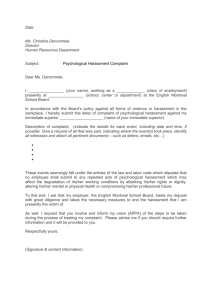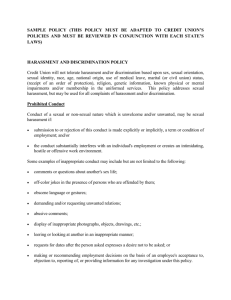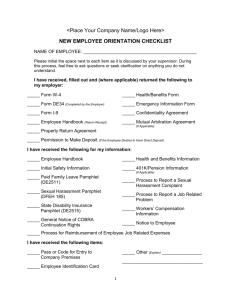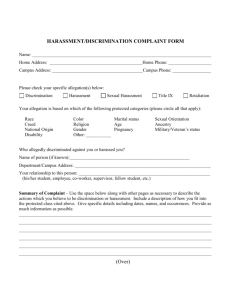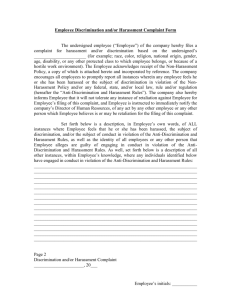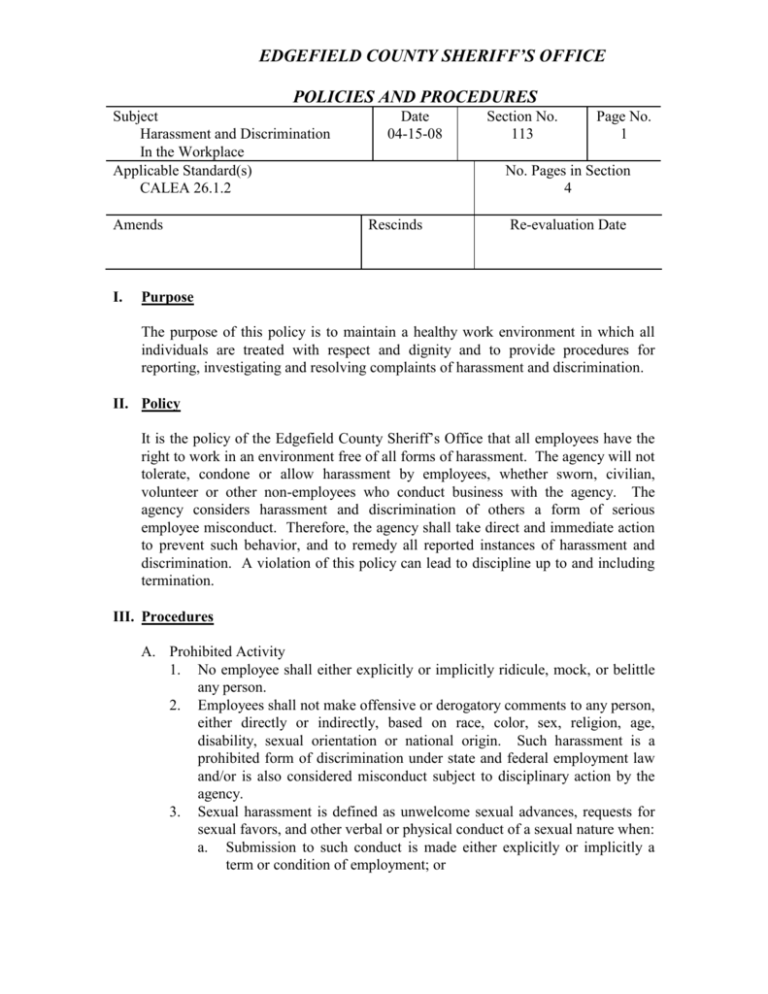
EDGEFIELD COUNTY SHERIFF’S OFFICE
POLICIES AND PROCEDURES
Subject
Harassment and Discrimination
In the Workplace
Applicable Standard(s)
CALEA 26.1.2
Amends
I.
Date
04-15-08
Section No.
113
Page No.
1
No. Pages in Section
4
Rescinds
Re-evaluation Date
Purpose
The purpose of this policy is to maintain a healthy work environment in which all
individuals are treated with respect and dignity and to provide procedures for
reporting, investigating and resolving complaints of harassment and discrimination.
II. Policy
It is the policy of the Edgefield County Sheriff’s Office that all employees have the
right to work in an environment free of all forms of harassment. The agency will not
tolerate, condone or allow harassment by employees, whether sworn, civilian,
volunteer or other non-employees who conduct business with the agency. The
agency considers harassment and discrimination of others a form of serious
employee misconduct. Therefore, the agency shall take direct and immediate action
to prevent such behavior, and to remedy all reported instances of harassment and
discrimination. A violation of this policy can lead to discipline up to and including
termination.
III. Procedures
A. Prohibited Activity
1. No employee shall either explicitly or implicitly ridicule, mock, or belittle
any person.
2. Employees shall not make offensive or derogatory comments to any person,
either directly or indirectly, based on race, color, sex, religion, age,
disability, sexual orientation or national origin. Such harassment is a
prohibited form of discrimination under state and federal employment law
and/or is also considered misconduct subject to disciplinary action by the
agency.
3. Sexual harassment is defined as unwelcome sexual advances, requests for
sexual favors, and other verbal or physical conduct of a sexual nature when:
a. Submission to such conduct is made either explicitly or implicitly a
term or condition of employment; or
POLICIES AND PROCEDURES
Subject
Harassment and Discrimination
In the Workplace
Date
Section No.
113
Page No.
2
b.
4.
Submission to or rejection of such conduct by an employee is used as
the basis for employment decisions affecting the employee; or
c. Such conduct has the purpose or effect of unreasonably interfering
with an employee’s work performance or creating an intimidating,
hostile, or offensive working environment.
Individuals covered under the policy include agency members defined as
employees and applicants for employment with the agency, whether sworn
or civilian, and all volunteers.
B. Employee Responsibilities
1. Each supervisor shall be responsible for preventing acts of harassment.
This responsibility includes:
a. Monitoring the unit work environment on a daily basis for signs that
harassment may be occurring;
b. Counseling all employees on the types of behavior prohibited, and the
agency procedures for reporting and resolving complaints of
harassment;
c. Stopping any observed acts that may be considered harassment, and
taking appropriate steps to intervene, whether or not the involved
employees are within his/her line of supervision; and
d. Taking immediate action to prevent retaliation towards the
complaining party and to eliminate the hostile work environment
where there has been a complaint of harassment, pending
investigation.
(1) If a situation requires separation of the parties, care should be
taken to avoid actions that appear to punish the complainant.
(2) Transfer or reassignment of any of the parties involved should be
voluntary if possible and, if non-voluntary, should be temporary
pending the outcome of the investigation.
e. Failure to carry out these responsibilities will be considered in any
evaluation or promotional decision and may be grounds for discipline.
2. Each supervisor has the responsibility to assist any employee of the agency,
who comes to that supervisor with a complaint of harassment, in
documenting and filing a complaint with the internal investigations unit or
other investigative authority as designated by the agency.
3. Each employee of the agency is responsible for assisting in the prevention
of harassment through the following acts:
a. Refraining from participation in, or encouragement of, actions that
could be perceived as harassment;
b. Reporting perceived acts of harassment to a supervisor; and
c. Encouraging any employee who confides that he or she is being
harassed or discriminated against to report these acts to a supervisor.
POLICIES AND PROCEDURES
Subject
Harassment and Discrimination
In the Workplace
4.
Date
Section No.
113
Page No.
3
Failure to take action to stop known harassment may be grounds for
discipline.
C. Complaint Procedures
1. Any employee encountering harassment is encouraged to inform the person
that his or her actions are unwelcome and offensive. The employee is
encouraged to document all incidents of harassment in order to provide a
full basis for investigation.
2. Any employee who believes that he or she is being harassed shall report the
incident(s) to his or her supervisor as soon as possible so that steps may be
taken to protect the employee from further harassment, and so that
appropriate investigative and disciplinary measures may be initiated. If the
offending party is in the complainants chain of command, the employee
may instead file a complaint with another supervisor, with the appropriate
internal investigations unit, the Captain, or the Sheriff.
a. The supervisor or other person to whom a complaint is given shall
meet with the employee and document the incident(s) complained of,
the person(s) performing or participating in the harassment, any
witnesses to the incident(s), and the date(s) on which it occurred.
b. The agency employee taking the complaint shall promptly submit a
confidential memorandum documenting the complaint to the
appropriate investigative unit.
3. The internal investigation unit shall be responsible for investigating any
complaint alleging harassment or discrimination.
a. The internal investigative unit shall immediately notify the Sheriff or
his designee and the prosecutor’s office if the complaint contains
evidence of criminal activity, such as battery, rape or attempted rape.
b. The investigator shall include a determination as to whether other
employees are being harassed by the person, and whether other agency
members participated in or encouraged the harassment.
c. The internal investigative unit shall inform the parties involved of the
outcome of the investigation.
d. A file of harassment and discrimination complaints shall be maintained
in a secure location.
4. There shall be no retaliation against any employee for filing a harassment or
discrimination complaint, or for assisting, testifying or participating in the
investigation of such a complaint.
5. The complaining party’s confidentiality will be maintained throughout the
investigative process to the extent practical and appropriate under the
circumstances.
6. Complaints or employees accused of harassment may file a
grievance/appeal in accordance with Edgefield County’s grievance
POLICIES AND PROCEDURES
Subject
Harassment and Discrimination
In the Workplace
7.
Date
Section No.
113
Page No.
4
procedures when they disagree with the investigation or disposition of a
harassment claim.
This policy does not preclude any employee from filing a complaint or
grievance with an appropriate outside agency.
D. Retaliation
1. Retaliation against any employee for filing a harassment or discrimination
complaint or for assisting, testifying or participating in the investigation of
such a complaint is illegal and is prohibited by the agency and by federal
statutes.
2. Retaliation is a form of employee misconduct. Any evidence of retaliation
shall be considered a separate violation of this policy and shall be handled
by the same complaint procedures established for harassment and
discrimination complaints.
3. Monitoring to ensure that retaliation does not occur is the responsibility of
the Sheriff, supervisors and the appropriate internal investigative unit.
__________________________
ADELL DOBEY, SHERIFF
IV. Documentation

